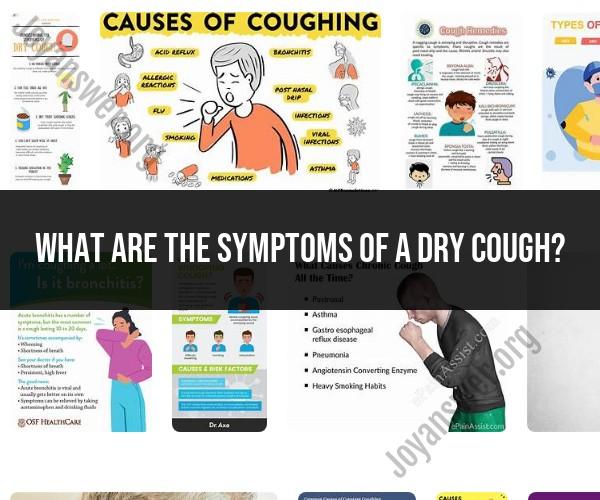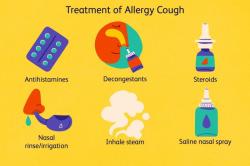What are the symptoms of a dry cough?
A dry cough is characterized by the absence of mucus or phlegm production, and it can have various associated symptoms and causes. Common symptoms of a dry cough include:
Coughing: The primary symptom of a dry cough is the repetitive, often persistent, and dry coughing itself.
Irritation: A dry, scratchy, or tickling sensation in the throat or back of the throat may accompany the cough.
Sore Throat: The persistent coughing can lead to throat irritation and soreness.
Hoarseness: Chronic coughing can sometimes cause the voice to become hoarse or raspy.
Difficulty Breathing: In some cases, a dry cough may lead to shortness of breath, especially if the cough is severe or prolonged.
Discomfort or Chest Pain: The act of coughing can sometimes cause discomfort or pain in the chest area.
Sleep Disturbance: Coughing can disrupt sleep, leading to fatigue and other related symptoms.
Triggers: The cough may be triggered or worsened by certain factors, such as cold air, allergens, smoke, or specific activities like talking or eating.
It's important to note that a dry cough can have various underlying causes, and the associated symptoms may differ depending on the specific cause. Identifying and addressing the underlying cause is crucial for effective management and treatment.
Common causes of dry cough include postnasal drip, gastroesophageal reflux disease (GERD), asthma, chronic bronchitis, allergies, medication side effects, and more. If you or someone you know is experiencing a persistent dry cough with concerning symptoms, it's advisable to consult a healthcare professional for a proper evaluation and diagnosis. Treatment will depend on the underlying cause and may include medications, lifestyle changes, or other interventions to alleviate symptoms and manage the condition effectively.
Unmasking the Symptoms of a Dry Cough: What to Look Out For
A dry cough is a cough that does not produce phlegm. It can be a symptom of a variety of conditions, including the common cold, allergies, asthma, and postnasal drip. Dry coughs can also be caused by irritants in the air, such as smoke and dust, or by certain medications.
Here are some of the most common symptoms of a dry cough:
- Hacking or tickling sensation in the throat
- Need to clear the throat frequently
- Hoarseness
- Sore throat
- Chest tightness
- Difficulty breathing
- Wheezing
If you have a dry cough that lasts for more than two weeks, or if it is accompanied by other symptoms such as fever, shortness of breath, or chest pain, see a doctor to rule out any underlying medical conditions.
Understanding Dry Cough: Common Signs and Indicators
Dry coughs can be caused by a variety of things, but they all have one thing in common: they irritate the airways. This irritation can cause the body to produce a coughing reflex in an attempt to clear the airways.
Here are some of the most common causes of dry coughs:
- Common cold and flu: These viral infections can irritate the airways and cause a dry cough.
- Allergies: Allergies to pollen, dust, pet dander, and other allergens can cause a dry cough.
- Asthma: Asthma is a chronic lung condition that causes inflammation and narrowing of the airways. This can lead to a variety of symptoms, including a dry cough.
- Postnasal drip: Postnasal drip is a condition in which mucus from the nose drips down the back of the throat. This can irritate the throat and cause a dry cough.
- Irritants in the air: Smoke, dust, and other irritants in the air can irritate the airways and cause a dry cough.
- Medications: Some medications, such as ACE inhibitors for high blood pressure, can cause a dry cough as a side effect.
The Dry Cough Mystery: Deciphering Its Telltale Symptoms
The symptoms of a dry cough can vary depending on the underlying cause. For example, a dry cough caused by a cold or flu may be accompanied by other symptoms such as fever, runny nose, and sore throat. A dry cough caused by asthma may be accompanied by wheezing and shortness of breath.
If you have a dry cough, it is important to see a doctor to determine the underlying cause and get the appropriate treatment.
To help your doctor diagnose the cause of your cough, be prepared to tell them about your symptoms, medical history, and any medications you are taking. Your doctor may also ask you to keep a cough diary to track your symptoms and identify any triggers.
Once the cause of your dry cough has been identified, your doctor can recommend the appropriate treatment. Treatment may involve medications, lifestyle changes, or a combination of both.
Here are some tips for managing a dry cough:
- Avoid triggers. If you know what triggers your cough, try to avoid those things. For example, if you are allergic to pollen, stay indoors on days when the pollen count is high.
- Stay hydrated. Drinking plenty of fluids can help to thin mucus and keep your throat moist.
- Use a humidifier. A humidifier can add moisture to the air, which can help to relieve a dry cough.
- Take over-the-counter medications. Over-the-counter cough syrups and lozenges can help to soothe a sore throat and reduce coughing.
- See a doctor. If your cough is severe or does not improve with home treatment, see a doctor. They may prescribe stronger medications or other treatments.












